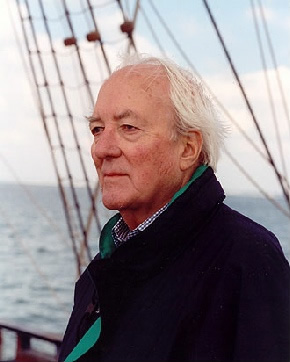About Douglas Reeman
BY KIMBERLEY JORDAN REEMAN
‘I am always asked to account for the perennial appeal of the sea story, and its enduring interest for people of so many nationalities and cultures. It would seem that the eternal and sometimes elusive triangle of man, ship and ocean, particularly under the stress of war, produces the best qualities of courage and compassion, irrespective of the rights and wrongs of conflict . . . The sea has no understanding of righteous or unjust causes. It is the common enemy, respected by all who serve on it, ignored at their peril.’
– DOUGLAS REEMAN

Douglas Reeman
(Photo by Kimberley Reeman)
ACCLAIMED AS ‘the foremost naval writer of this century,’ Douglas Reeman was born in Thames Ditton, Surrey, England in 1924. With the outbreak of World War Two, and despite belonging to an army family, he joined the Royal Navy without hesitation at the age of sixteen. He saw service in the North Sea and Arctic, and the Atlantic and Mediterranean campaigns, beginning as a midshipman in destroyers and transferring later to motor torpedo boats, where he was twice mentioned in dispatches.
Following the war, he held a variety of jobs, including delivering yachts, selling marine engines, and walking the beat in London's East End as a uniformed policeman and in the plain-clothes Criminal Investigation Department. He returned to active service during the Korean War, and remained a naval reservist while working as a children's welfare officer for the London County Council, retaining that close contact with the navy which was to prove so invaluable.
In 1957, having published two short stories, Douglas wrote the fictionalised version of ‘his war’ on the backs of L.C.C. nit notices, more for his own satisfaction than out of any hope of publication. A Prayer for the Ship was published in 1958, and was the beginning of a remarkable career.
Ten years later, having established himself as one of the foremost modern sea-story writers of his time, Douglas returned to an earlier love, the ships and men of Nelson’s day, and embarked on a new and challenging phase: a series of novels featuring one man and spanning that splendid, stirring era. For this series he chose the pseudonym Alexander Kent, the name of a childhood friend and fellow naval officer who was killed in the early years of the war. In June of 1968, To Glory We Steer was published, and its solitary, sensitive, compassionate hero, Richard Bolitho, was introduced to an ever growing readership.
Today the exploits of Richard and Adam Bolitho are featured in twenty-eight novels, the lives and deaths of other men, equally heroic, in thirty-five Reeman novels.
Kent and Reeman are published in fourteen languages around the world, including Finnish, Polish, Spanish, French, and Portuguese, and count thousands of Germans and Japanese among their most passionate adherents. More than twenty-three million copies have been sold, and an extensive reprinting programme is underway, even as the books are being offered in electronic and digital download editions.
Richard Bolitho’s influence on Douglas Reeman’s personal life has been profound. In 1980, while in the midst of a gruelling Canadian tour, he met the woman who was to become his second wife. Kimberley Jordan, also a novelist, had come to Douglas’s reading at Toronto’s Harbourfront complex as a fan of the Bolitho novels. In 1985 they were married in Toronto, the culmination of a romance credited at least partly to Richard Bolitho, and on a date which, quite coincidentally, was that fictional hero’s birthday.
Douglas Reeman has often said that he regards himself as Bolitho’s secretary only — as one chosen to tell his story, which for more than thirty years has illuminated a dark past, inspired, educated, but above all entertained.
